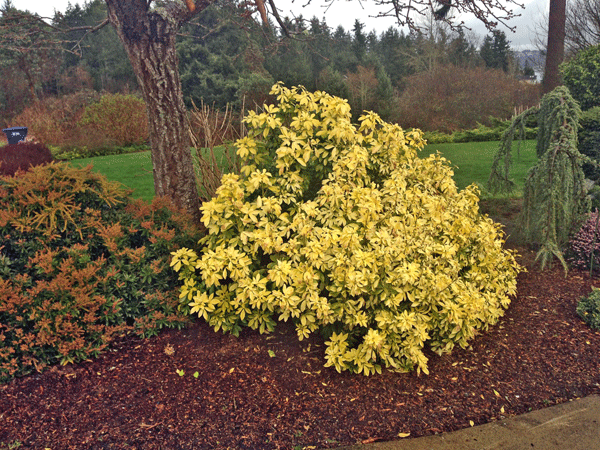A year or so ago, I planted a special kind of Japanese maple in my sister’s landscape. I traveled up to her house recently to celebrate our birthdays — which are only two days apart — and to check on the maple’s progress.
Prized for their brilliant salmon-red bark, which is much brighter than the regular coral bark maple, my sister’s Beni Kawa Japanese maple is coming along fine. I forgot to buff the bark with a soft cloth to polish it which keeps the color bright but I’ll be sure to remember that next summer when I visit again.
I also wanted to check in on her neighbor’s organic garden that I wrote about last summer. Bob was happy to show me what’s in the works for this year. Although he was fighting a cold — you can’t keep a good gardener down — he shared a few tips he is trying out this year.
Raw sawdust is his magic weapon in the strawberry patch. Sprinkled between the strawberry plants, it is said to prevent annual weeds from germinating. He’ll get back to me with the results later in the season.
His grapes were nicely pruned, the raspberries just starting to bud, and the garlic which he planted last fall was about a foot high.
The raised veggie boxes have been planted with lots of peas. Inside the greenhouse, several types of kale and lettuce were just emerging in their flats.
Bob told me that this year again everything seems to be about three weeks early — sound familiar?
As I walked the neighborhood, enjoying the various blooming plants and taking in the sights of majestic Mount Rainier and the Puget Sound, I admired many plants that also thrive here.
A plant that grows in a multiple of growing conditions is always a winner in my garden. Here are a few notables from Fox Island.
What could a plant that is iconic of Scotland have in common with our area? Easy-to-grow heather and true heath look great in the garden at any time of year.
Although both belong to the Ericacaea family, they are botanically different and are divided into the Calluna genus and the Erica genus. In the garden, however, they are nearly identical in color, shape and growing habits.
I love their colorful foliage and flowers and have seen the true heath, Erica canaliculata “Rosea” blooming now also in gardens in our area.
It is tolerant of winter lows a bit less than 25 degrees and will thrive in soil that is more alkaline than the calluna vulgaris heathers.
Calluna types need more organic matter in the soil to really do well. Our acidic mixed redwood soils provide this and calluna cultivars are very cold-tolerant. All need good drainage.
Another shrub that I admire where ever I find it is Valley Rose’s Lily-of-the-Valley. The other vivid rose variety which grows a bit taller is Valley Valentine.
It seemed most gardens on Fox Island had at least one of these beautiful plants in full bloom including the stunning white flowering forms. Books might tell you they require average water but established specimens are remarkable tolerant of drought.
Although it wasn’t blooming yet, I came across a lovely choisya Sundance also called Mexican orange blossom shrub which describes the fragrant orange blossom-like blooms. The new growth of this fast-growing, evergreen, deer-resistant shrub is colored bright chartreuse and provides year-round color to the garden.
To round out my tour of local landscapes on Fox Island, many of the early rhododendrons were starting to bloom.
Covered with vivid pink flower trusses they looked great planted with viburnum davidii, daffodil and narcissus, iberis and black mondo grass. All grow great in our area, too. We have a lot in common despite the distance between us.
– Jan Nelson, a landscape designer and California certified nursery professional, will answer questions about gardening in the Santa Cruz Mountains. E-mail her at ja******@*ol.com, or visit www.jannelsonlandscapedesign.com to view past columns and pictures.












